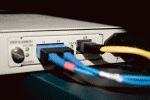
New research suggests that noise canceling tech isn’t just for blocking out the screaming baby or chatty couple sitting next to you on that transatlantic flight – it could also greatly improve the quality, reliability and speed of our Internet connections, according to new research published by Nature Photonics and spotted by VentureBeat. By eliminating background noise, noise-canceling technology could result in a cleaner signal across a fiber optic cable, increasing speed and quality of connection.
The use of light beam transmissions designed to cancel out the noise associated with the main signal travelling over long-distance fiber optic networks could boost speeds by as much as 400 percent, according to Xiang Liu and his research team from Bell Laboratories, who published the study. That would mean 400 gigabits per second transfer rates over cables that span 12,800 km (cyclist Ryan Stotland covered seven countries across South America spanning less than that distance in 2009, as a point of reference), which means it would be terrific for bringing high-speed Internet that connects whole continents to one another.
The benefits are huge in terms of being able to vastly improve international data connections without making big, costly and receptive changes to the hardware that forms the infrastructure of the Internet itself. Plus, the changes that would be made possible thanks to Liu’s research wouldn’t be an incremental improvement in throughput – a 400 percent increase has a lot more potential to help deal with the world’s rapidly growing bandwidth requirements than even something like Google’s ambitious Fiber Internet programs in Kansas, Austin and Provo, Utah in the U.S.
There’s no word on when exactly this could feasibly be introduced and result in changes that consumers will be able to glean benefits from, but it’s an elegant solution to a problem that has vexed network engineers and scientists for a while now, so hopefully we’ll see more progress come out of Xiu’s research soon. Considering that Google’ Fiber’s network would cost $11 billion to build out nationwide, cost will likely be a factor in determining how quickly this gets embraced.

